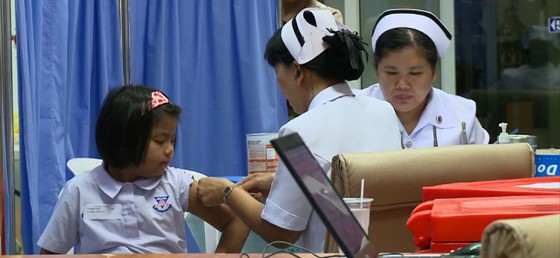
A Thai schoolgirl receives Sanofi’s vaccine as part of the dengue trial
Sanofi remains on track to bring the first vaccine against dengue fever through development after encouraging data in a phase IIb study, although there are some unanswered questions about its efficacy.
At present there is no vaccine or pharmacologic treatment other than supportive care for dengue fever, which is the most widespread tropical disease after malaria, and an effective vaccine could have a huge impact on public health worldwide as well as blockbuster sales potential.
Sanofi started a large-scale study of its CYD-TDV vaccine in 2009, administering the vaccine to more than 4,000 children aged four to 11 in Thailand in three separate doses equally spaced over 18 months.
Data published in The Lancet today indicate that the vaccine was around 30 per cent effective, depending on the serotype of the virus causing the disease, but was unable to stimulate a response against one of the most prevalent strains in the study cohort.
The efficacy rate was lower than expected by the investigators, but nevertheless is the first-ever demonstration that a safe and effective vaccine against dengue fever is feasible.
“In the context of World Health Organization goals to reduce dengue mortality by at least 50 per cent and the morbidity rate by at least 25 per cent by 2020, this study represents a major milestone,” write the authors of the study.
Meanwhile, a higher rate of dengue fever than forecast allowed them to look at specific virus serotypes and draw some interesting conclusions.
CYD-TDV appeared to be effective against three serotypes – DENV1, 3 and 4 – but a lack of efficacy against the most common DENV2 serotype, despite stimulation of an immune response, pegged back the overall efficacy rate of the vaccine.
That has prompted speculation that the serotype used in the vaccine was different to the one that was circulating in Thailand at the time the study was conducted.
An editorial accompanying the study by Dr Scott Halstead of the International Vaccine Institute in Seoul, South Korea, notes that the efficacy rate means that “celebration will be muted”. He said however that Sanofi has administered the vaccine to 30,000 adults and children in a much-larger study that will provide greater insight into efficacy rates by serotype.
While generally self-limiting, dengue fever has a mortality rate of up to 5 per cent without supportive care such as fluid replacement. Carried by mosquitoes, the viral disease is a threat to almost half of the world’s population.
There are estimated to be 50-100 million infected individuals at any one time, mostly distributed in South and Central America, sub-Saharan Africa, India and Southeast Asia.




